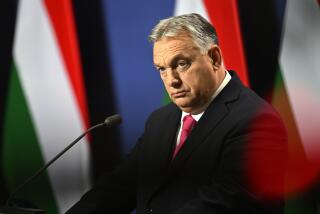Albright Urges Kosovo Rebels to Take Deal
- Share via
RAMBOUILLET, France — In more than two hours of intensive talks Sunday, Secretary of State Madeleine Albright urged Kosovo’s rebels to shed their remaining reservations about an autonomy plan for the province, a step that would clear the way for NATO airstrikes on recalcitrant Serbs.
Albright said the ethnic Albanian negotiators are “working very hard and are moving toward a yes” on the peace plan that was drafted for the separatist Serbian province by the United States and five European powers and then given to the warring factions on a take-it-or-leave-it basis.
U.S. officials said Albright advised the ethnic Albanians that if they accept the proposal and the Serbs reject it, the North Atlantic Treaty Organization is prepared to launch a bombing campaign against Serbia. But if the Albanians also reject the peace plan, bombing is impossible.
Albright told reporters gathered in a drizzle outside the Rambouillet City Hall that the Serbian government had not relaxed its opposition to a NATO-led force to police the agreement. The Serbs said Saturday that they had accepted the political aspects of the accord.
Albright, who also met for a little less than an hour Sunday with Serbian President Milan Milutinovic, said the Serbs have refused to even seriously discuss NATO’s plan to dispatch a 28,000-strong peacekeeping force, including about 4,000 Americans, to enforce the agreement. Without the peacekeepers, Albright said, the political pact would be only “a piece of paper.”
Although Serbia is the dominant republic of what remains of Yugoslavia, the population of Kosovo is 90% ethnic Albanian.
The Contact Group--a consortium of the U.S., Britain, France, Germany, Italy and Russia that coordinates Balkan peace efforts--originally gave Kosovo’s two sides until noon Saturday to reach agreement. But the group extended the deadline until Tuesday.
Albright said Sunday that four outcomes are now possible: agreement by both sides, which would guarantee the Albanian majority substantial self-rule for the next three years while keeping the region legally a part of Serbia; acceptance of the pact by the Albanians but not the Serbs, in which case NATO would bomb Serbia; acceptance of the plan by the Serbs but not the Albanians, in which case the U.S. and its allies would drop all support of the Albanian cause and clamp an arms embargo on the rebels; and a failure by both sides to agree.
In the case of disagreement by both sides, she said, “there will not be bombing of Serbia, and we will try to figure out ways to continue to deal with both sides.” But U.S. officials said it is unlikely that the Rambouillet talks will continue after Tuesday.
U.S. officials said the main sticking point for the Albanians is their demand for a binding referendum on independence at the conclusion of the three-year autonomy period. Albright has told them that there is no chance the international community would agree in advance to honor the outcome of such a vote. The United States, like most countries, opposes independence for the province.
Instead of a referendum, Albright is offering the Albanians a promise that the international community will consider--although not necessarily endorse-- “the voice of the [Albanian] people” concerning Kosovo’s final status. Washington considers that to be a major concession. Albright’s task is to bring the Albanians around to that view.
Albright had the 14th century Rambouillet chateau pretty much to herself Sunday because the British, French, German and Italian foreign ministers were attending a one-day European Union meeting in Luxembourg and Russia’s Igor S. Ivanov was on an official visit to Japan.
But French Prime Minister Lionel Jospin weighed in by calling on both the Serbs and the ethnic Albanians to accept the peace deal, which he said would allow them to join the modern world and leave the 19th century behind.
Jospin joined Albright in warning of airstrikes if the Serbs deadlock the conference.
“The two parties to the conflict, and notably the Serbs, should have no illusion in this respect,” he said.
Meanwhile, Russia stepped up its rhetoric against NATO airstrikes, saying peace talks had made “serious progress” toward a Kosovo settlement and warning that no troops should be deployed in Yugoslavia without its express approval.
“Yugoslavia is a sovereign state and should itself determine the degree of the presence of international forces, civilian or military,” Ivanov said in Japan, according to Russia’s Interfax news agency.
“We view as absolutely inadmissible any airstrikes used to achieve Yugoslavia’s agreement to the presence of foreign troops,” said First Deputy Foreign Minister Alexander Avdeyev, who is representing Russia in Rambouillet. His comments were also reported by Interfax.
It is not clear how Russia would react to NATO airstrikes. The country clearly lacks the military strength to block such a move. However, Russians feel a strong bond to Serbs, who like them are Orthodox Slavs, and probably would be incensed by any military action against them.
*
Times staff writers John-Thor Dahlburg in Paris and Maura Reynolds in Moscow contributed to this report.
More to Read
Get the L.A. Times Politics newsletter
Deeply reported insights into legislation, politics and policy from Sacramento, Washington and beyond. In your inbox twice per week.
You may occasionally receive promotional content from the Los Angeles Times.










